Let’s say you hope to become a better fly fisher. You want to improve your skills, and catch more trout, and have more fun.
And let’s say you have a chance to ask some of the world’s most acclaimed fly fishers one question. Just one. What would it be? Would you ask them where you should fish, or what fly to use, or which rod to buy? Would you ask about knots, or fly lines, or techniques, or how to improve your casting? Or would Winston Churchill’s admonition that “only wise men learn from their mistakes” echo through your subconscious as you tried to frame your question?
I’m pretty sure I fall into that final category, so it shouldn’t be a surprise that I reached out to the School of Trout’s instructors and asked them which angling mistakes are the most important to avoid. Their responses follow.
Bob White, member of the Freshwater Fishing Hall of Fame, artist, author, and former recipient of Fly Rod & Reel magazine’s “Guide of the Year” honors:
Here are a few important mistakes to avoid when trout fishing …
Rushing into the water. The most important time on the water is often spent watching, not fishing. It’s a common mistake; we arrive at our destination excited to fish … and more likely than not when we rush into the river at our favorite spot, we’re spooking fish that we may not even see… and these spooked fish telegraph their nervousness to others. Early in the morning, before the sun is high, you’ll often find big fig fish cruising the shallows. When you arrive at the river, take your time and carefully examine the entire scene, particularly the water at your feet and close to shore.
Making long casts to those juicy “prime" spots and spooking everything in-between you and your best effort. I find it interesting that when we fish from a boat, we cast to the shore … but when we’re on shore, we feel compelled to cast as far out into the water as possible. When prospecting, start close and work your way out. Then, relocate and repeat.
Tirelessly casting over the same fish. In my experience, the first drift over a rising fish is the most important one. Even if it isn’t perfect, play it; I’ve caught some of my best fish on my first (imperfect) cast. In my experience, a quickly repeated second cast has half the chance of success … and next one, half of that. If you’re lucky enough to have eyes on a rising fish, it pays to take a few moments to check your leader and tippet, and to identify what the fish is feeding on, and where it’s feeding; is it taking dries off the surface, or emergers in the surface? Change your fly to match the targeted insect, and sharpen the hook if it needs it.
Craig Mathews, internationally-acclaimed angler, author, fly designer, and founder of Blue Ribbon Flies in West Yellowstone, Montana:
Lack of patience. When arriving on a stream, sit on the bank and observe for a minute or two rather than jumping in the water and beginning to cover it. Usually you can determine what the fish might be feeding on by watching the water for insect activity, or by examining stream-side vegetation or cobwebs for insects. By fishing an imitation you increase your odds that you will have a productive day on the water.
Kirk Deeter, author, fly fishing guru and editor of TROUT magazine:
Wading too far out, stomping on fish, or casting too far and lining fish.
Tom Rosenbauer, author, angling expert, and one of the most respected fly fishers on the planet:
Not paying attention to your leader, especially your tippet length.
Jeff Currier, internationally-recognized fly fishing savant, author, and artist:
There’s no excuse for losing a fish because of a bad knot. Just imagine, you find a big beautiful rainbow trout sipping mayflies under a willow. You successfully make a challenging cast and your drift is perfect. The fish eats your fly and he’s on, but for only a second. Frustrated, you bring in you leader only to notice the pigtail in the end of your tippet. Your leader-to-fly knot slipped!
Hilary Hutcheson, owner of Lary’s Fly & Supply fly shop, fly fishing ambassador, guide, and longtime host of Trout TV:
Avoiding weather mistakes is super important. If you're cold and wet or overheated, your day comes to an early end. So, pay attention to the radar to see when storms are expected to blow in, when the wind is maxing out, or when it's too hot for fish and humans.
Tim Romano, professional photographer, fly fishing rock star, and managing editor of Angling Trade magazine:
Personally, I need to constantly remind myself to slow down in general. In all aspects. The slower and more methodical I am when rigging, observing the water before fishing, and actually fishing, really seems to help my game.
Pat McCabe, expert angler & fly caster, former guide, fly fishing instructor:
Stop spooking fish. Pay attention to your surroundings, the water conditions, the wind, the sun, the available cover, and the trout. You can’t catch a fish that you’ve scared away. It all comes down to being focused on your goal. Once you locate a fish, concentrate on stalking and presentation.
Steve “Mac” McFarland, longtime fly fishing guide and professional instructor:
Line management. Trying to cast when you have slack in the line because you are too focused on the fly and not focused enough on the fly line. It's like going to a class when you haven't done your homework. And check behind you before you make your back cast ...
John Juracek, angling guru, fly casting instructor, author and fly designer:
A careless approach to the water is the most important mistake to avoid. You can be the world’s greatest caster, making one superb presentation after another with the perfect fly, but if you’ve already spooked the fish, the game is over. It's imperative to remember that the fish we’re after are wild animals, and want nothing to do with us. If we respect their wildness by way of a cautious, studied approach and stealthy casting, we give ourselves a great chance to fool them.
Of course, those aren’t the only errors we’re likely to make. There are literally millions of things that can go wrong on the water. I’ll close with three mistakes that I’d personally rather not repeat.
A lack of awareness. Remember to pay attention to your surroundings. I’ve gotten so engrossed with my fishing that I’ve waded right into deep, dangerous water, and missed the grizzly bear walking on the bank, and been smashed into from behind by a huge chunk of floating ice. Concentration is important, but it should never trump awareness.
A lack of water. No, not the water you’re fishing. When you forget to bring something to drink, you get dehydrated — and dehydration sucks in every possible way. Remember to fill your water bottle, and to bring it along when you go fishing.
Anger. It’s natural to get angry when you fish poorly or when something goes wrong. It’s also a mistake. Fly fishing is all about enjoying yourself. If you get angry when you’re on the water, your physical performance will deteriorate at the same time your mental outlook suffers. Don’t worry when things go sideways, and definitely don’t get angry. Just remember that you’re out there to have fun, and focus on those positive vibrations.




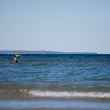

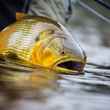



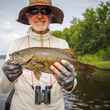



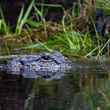

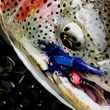
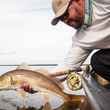

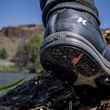

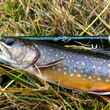



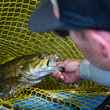
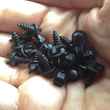



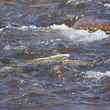
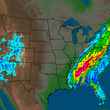
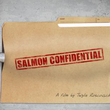
Comments
Kerry Gubits replied on Permalink
Great article and excellent advice. I like the last pieces added by the author. Getting almost knocked over by a giant slab of floating ice taught me awareness. Being hydration aware, especially in the dry summer southwest, is terrific advice. I recommend filter bottles and Steripens to avoid carrying water! Hillary's advice about weather is also great! Being aware of all these things sensitizes you to the moment, and when you are in the moment, you'll be more aware of the fish, and the fishing game.
steve matthews replied on Permalink
If 'you are getting angry while fly fishing then your problem is not in the fishing. Get counseling,
Jim Kramer replied on Permalink
Great article Todd. Lots to think about and I especially like the before-the-first-cast comments. But I think the sins you mention are the minor, forgivable sins. At the risk of sounding preachy, I think the 7 Deadly sins are:
1. Changing waters without cleaning your boat or equipment.
2. Fishing when the water is too warm.
3. Not removing the barbs on your hooks.
4. Playing a fish too long before releasing it.
5. Mishandling a fish while releasing it.
6. Carelessly removing a fish from the water for the "hero" shot.
7. Hooking and releasing too many fish in one day on heavily fished rivers.
Steve Matter replied on Permalink
Excellent points.
Barry Jones replied on Permalink
Really enjoyed this article some very interesting points that I will keep in mind when I go fishing although I fish mainly still waters in the UK. I've only been fly fishing for a few years now and still learning casting techniques plus types of knots, droppers, Etc. Could I ask do you ever do articles on still waters?
Many thanks
Barry
JJ Canz replied on Permalink
Outstanding article and so true.......some of the mistakes I avoid....some mistakes I make, however I never saw them as mistakes....I do now and I will correct.....therefore becoming a better fly fisherman and better fisherman in general.....Thanks
Jeffrey Barnum replied on Permalink
These are fine suggestions, but one key consideration is missing in our offen crowded endeavor. And that's etiquette. It is essential that we ask to fish near another person. Is that person moving down or up through a pool? How is that person fishing? Nymphing or swinging? Your distance from he or she can vary a great deal. There is much to be written on this subject.
Bob Vince replied on Permalink
100% agree on watching your surroundings before fishing. I wait to rig up riverside until after I observe the river for a bit. I often wonder if rod vaults result in folks leaving the car “all rigged up” and not spending time observing.
Pages